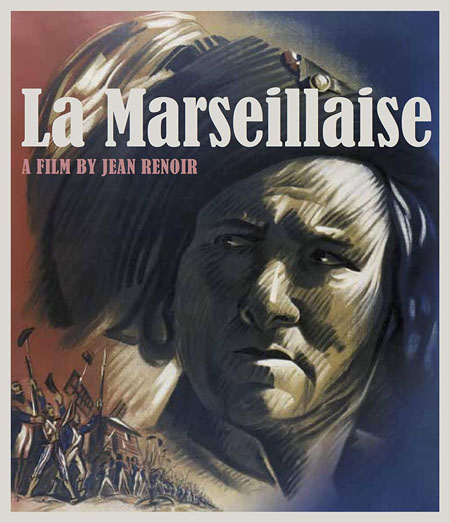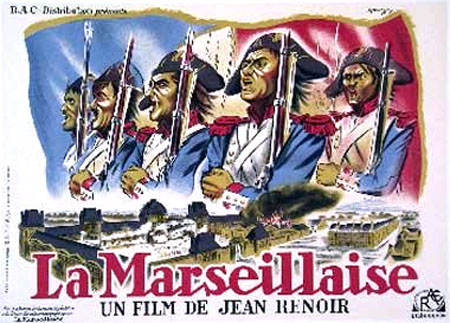
“REVOLUTION
À LA RENOIRâ€
By
Raymond Benson
French
filmmaker Jean Renoir, son of the famous Impressionist painter Auguste Renoir,
is often cited as not only France’s greatest director of all time, but he also
frequently appears on lists of most important international names as well. This
reputation is well deserved, especially for his work in the 1930s, which
included Grand Illusion (1937) and The Rules of the Game (1939).
One
of his lesser-known pieces from this period, La Marseillaise, has been
restored and released in high definition by Kino Classics, and it is a cause to
re-evaluate this benchmark picture.
La
Marseillaise is
an epic period costume drama (but with plenty of comic vignettes) about the
beginnings of the French Revolution, and it sports a broad canvas of many
characters and locations. Coming off of the success of Grand Illusion,
the picture had a fairly large budget and no less than five cinematographers.
The movie runs 132 minutes, but it feels longer due to Renoir’s sometimes episodic
and lengthy takes. That doesn’t mean the movie is boring. It just takes a bit
of work on the viewer’s part to get through it, for which there is just reward.
The
story moves across various settings, from King Louis XVI’s palace (he is played
with great vigor by Renoir’s older brother, Pierre Renoir), where Louis and
Marie-Antoinette (Lise Delamare de la Comédie Français)
cavort in all the bourgeois trappings that eventually got them executed. Most
of the tale, though, focuses on the peasants, the countrymen, and the
revolutionaries who brought about one of the most significant events in human
history. If there are any protagonists of the picture, they are the ordinary
citizens-turned-adventurers who drive the plot.

Of
course, the song, “La Marseillaise,†the French national anthem, originated
during these times and figures prominently in a key scene during a march to
battle. This is a masterful sequence that illustrates Renoir’s gifts of dramatically
using history, patriotism, and politics to make a point.
Kino
Classics’ restoration is remarkably good, given the age and rarity of the
movie. It comes with an audio commentary by film critic Nick Pinkerton. A short
archival interview with Renoir from the 1960s about the film is a welcome
supplement, but of particular interest is the excellent essay by Yale film
scholar Dudley Andrew in the enclosed booklet.
For
fans of Jean Renoir, European history, and 1930s international filmmaking, La
Marseillaise is a grand soufflé.
CLICK HERE TO ORDER FROM AMAZON